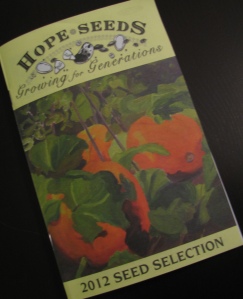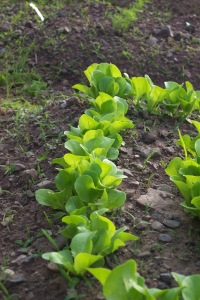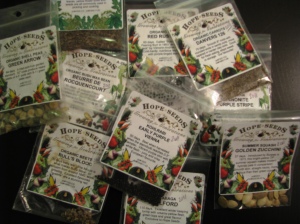My seed catalogue from Hope Seeds came in the mail a few days ago and today I put in my order.
Hope Seeds is a small seed company based out of Granville Ferry, Nova Scotia. The company is run by Andrea Berry, a great farmer and passionate supporter of sustainable organic agriculture and local food systems. I first met Andrea in 2001 when we were both working at the Falls Brook Centre – a sustainable community development and training centre in central New Brunswick. She was the agricultural coordinator and did a great job of keeping the 2 acres of vegetable gardens in production and looking after the fruit orchard and shiitake mushroom production site.
I like to order my seeds from Hope Seeds because it’s a local company that offers organic and heritage seeds. Heritage seeds are seeds that were in use pre-1945 (pre-modern agriculture) and have a traceable history.
One of the heritage varieties that caught my eye this year and that I ordered is the ‘Goose Gullett’ bush dry bean. It is described as “A true Acadian legend! In 1755, Acadians deported through the Bay of Fundy purposely crashed their ships along the banks of Clare County (Digby area). Survivors hid in the woods, living with the Mi’gmaw, lost to the ruling British. Acadians found this bean in the gullet of a downed goose that Fall, saved and planted the seeds next Spring. It has been grown by the locals in the area even since.”
I wasn’t planning on planting bush dry beans this year, but the description intrigued me. I am Acadian and love the thought of continuing this heritage variety in my garden.
Hope Seeds grow many of their seeds on Andrea’s property in Nova Scotia, but also source seeds from various farms in the Atlantic provinces of Canada and eastern Canada. In the catalogue Andrea notes whether seeds are local and certified organic; local, but not certified organic; certified organic, but not local; or conventional seeds. If the seeds are local, she notes which farm they come from. I love knowing this information.
I still have lots of seeds left over from last year, but I have to order some new ones to replenish those that were all used up and also to start seedlings indoors, something I didn’t do last year. This year I am ordering green beans, dry beans, beets, broccoli, cucumber, peppers, tomatoes, snap peas, carrots, romaine lettuce, borage, and calendula.
I can’t wait for my seeds to arrive!
Have you ordered/bought your seeds?
(ps. I’m not being compensated to write about Hope Seeds and although I know Andrea, I would still recommend the seed company if I didn’t know her, as it’s a great local source of organic seeds).




Is there a genetic value in the pre-1945 lineage that’s of importance? Did industrial agriculture select for the wrong traits in their selective breeding programs?
I’m definitely no expert on this, but from what I understand a lot of seeds that are used in modern industrial agriculture are focused on producing vegetables that look good and are able to withstand long-distance shipping. So the seeds are good for the purposes they’re bred for, but as a home gardener I’m more interested in taste than looks, and the furthest my veggies usually go is on the south side of the city 🙂
I’m no expert either. From my own experience, however, I believe that today’s hybridized vegetables do not contain the same nutritional value that there heritage, or heirloom, cousins do, nor do they have the same great taste. Instead, they are chock-full of synthetic “everything” and are so genetically modified that even a ‘tomato’ no longer fits the true definition of whole food.
Thank you for adding to the discussion Kelly.
I will be adding this company to my list! I didn’t realize there was someone in Atlantic Canada selling heritage seeds or I would have ordered from them. As it is this year I ordered heritage varieties from Heritage Harvest in Manitoba. After working as a volunteer doing seed collecting at a botanical garden for several years the importance of preserving open pollinated varieties of plants really became clear to me. Constant hybridizing, while it may enhance some traits in a plant, unfortunately cause us to lose many other traits.
I’m glad I could spread the word about Hope Seeds. It’s really nice to be able to order local seeds. And I agree, preserving open pollinated varieties is so important.